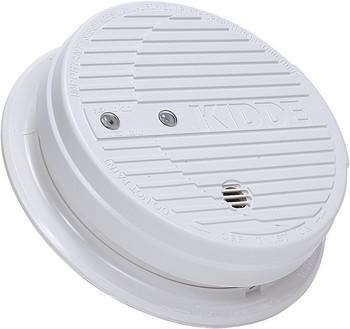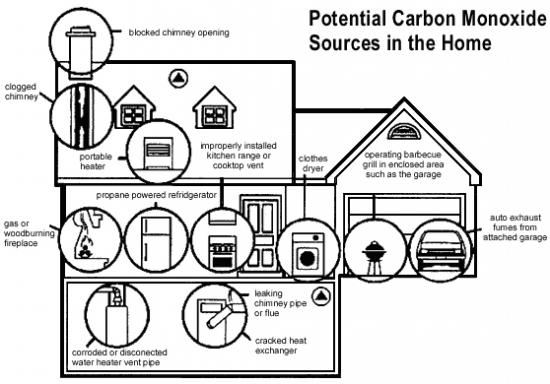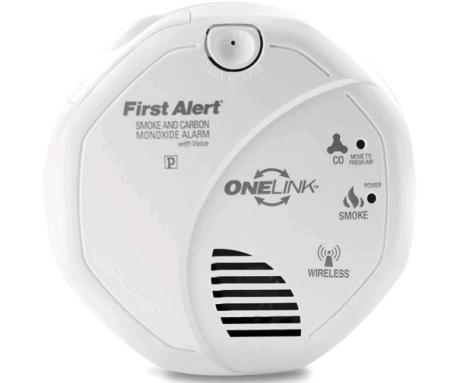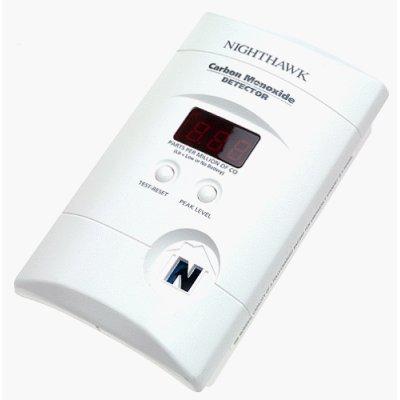|
Click here for fire safety and education and tips
The Municipality of Powassan has a very dedicated 40 member Volunteer Fire Department.
The Department holds a Food bank drive each year during the spring.
If you are interested in applying for a position on the Volunteer Fire Department forms can be picked up at the Municipal Office during regular business hours.
Of course, the best way to practice fire safety is to make sure a fire doesn't break out in the first place. That means you should always be aware of potential hazards in your home. Start by keeping these tips in mind:
- Are your electrical appliances in good condition, without loose or frayed cords or plugs?
- Are your outlets overloaded with plugs from the TV, computer, printer, video game system, and stereo?
- Are you overusing an extension cord?
- Do the light fixtures in your home contain bulbs that are the correct wattage?
- Does your home contain GFCIs (ground-fault circuit interrupters) and/or AFCIs (arc-fault circuit interrupters), which prevent electrical shock and fire by shutting off faulty circuits.
- Working fire alarms on each level of a residence is the law. Fines may be levied for violations of the fire code.
For more Fire Safety Practices please visit the Fire Safety page on the Kids Health website.
For more information on Fire prevention please visit the Office of the Fire Marshal website.
The Ontario Fire Code
The Ontario Fire Code (Part 2 Section 2.6, Article 2.6.3.4) states that “”open air burning shall not be permitted unless approved or unless such burning consists of a small, confined fire, supervised at all times, and used to cook food on a grill or barbeque”". The burning of any material in the open air within the Municipality of Powassan is governed by By-law 2019-07.
By-law 2019-07 applies to the setting and control of fires in the open air on all lands within the geographical limits of the Municipality of Powassan.
Before setting, or permitting the setting of, an Open Air Fire, the owner of the land upon which the fire is to be set must obtain a Fire Permit from the Municipal Office during regular business hours.
Specific Restrictions:
What Type of Burning Permit Do I Need?
1. Where do I live?
- different restrictions apply to different areas of the municipality.
-Within the settlement areas of Powassan and Trout Creek, only Recreational Burning Permits (campfires) can be issued.
-Properties in the surrounding rural areas of the municipality are eligible for all other permits (Non-recreational, Agricultural, or Fireworks).
2. What type of burning would I like to do?
-Recreational Burning Permits are for small “campfires” intended for recreational practices. They must be contained in a device with a diameter no greater than 61cm. The material being burned is restricted to clean, dry, seasoned wood. Permits are $30 and are valid from the date of purchase until December 31st of the year of purchase.
-Non-Recreational Burning Permits are for burning brush/yard waste piles. Piles must not exceed 2m in height or diameter. These permits are only available in the rural areas. Permits are required any time of year. There is no charge for a permit from November 1st to March 31st. The price from April 1 to October 31st is $10/10 days or $30/30 days. Burning of garbage or debris is always prohibited.
-Agricultural Burning Permits are for the burning of crops in accordance with normal agricultural practices. This is available only in the rural areas of the municipality. 20m setbacks from lot lines and structures are required.
-Fireworks Permits are for the discharge of consumer class fireworks. These can only be issued for properties in the rural area of the municipality. These permits are $30 for 3 days.20m setbacks from lot lines and structures are required.
Key Points
- All fires, at all times of year require a permit
- All fires must be supervised by an adult until extinguished
- Suitable means of extinguishment must be immediately at hand while burning
- Only a property owner may apply for a burning permit. Renters or employees are allowed to burn with written permission from a property owner. The property owner/permit holder is ultimately responsible for any damage resulting from fires that get out of control.
- Burning of garbage has always been and is still prohibited.
- No burning when wind speeds exceed 15km/h
- Non-recreational burning shall take place between 6:00pm and 1:00am only.
Forbidden Materials: The burning of industrial waste, agricultural waste, domestic waste, petroleum products, rubber, painted (or treated) lumber, mixed demolition debris, any material that will cause excessive smoke or harmful fumes, as well as any other material identified in regulations contained in the Environmental Protection Act will not be permitted and is forbidden.
Fire Extinguishing Costs:
If the Powassan Fire and Emergency Services Department is called to respond to a fire either set or permitted to burn in violation of the By-law, the person who set the fire or allowed it to burn, as well as the owner of the land on which the fire occurred if he/she allowed the fire to be set or permitted the fire to burn, shall pay all costs incurred by the Powassan Fire and Emergency Services Department to extinguish the fire. Costs included are those for all personnel, equipment and apparatus dispatched and used to extinguish the fire.
For an uncontrolled fire, costs will be applied at the rate of $175.00 per half hour (thirty minutes) for each fire fighting apparatus accompanied with four (4) personnel; or crews of eight (8) personnel. Time will be charged from the receipt of the alarm through to the time all responding personnel leave the location of the fire and return to their respective stations.
If the costs of extinguishing an unauthorized open air fire are not paid, as outlined above, in addition to any other remedies the Municipality may have, the costs shall be recovered in the same manner as municipal property taxes in accordance with Section 398(2)2 of the Municipal Act S.O. 2001, c.25 against the owner of the land, if the owner set the fire, allowed the fire to burn or permitted the fire to be set or to burn, in violation of this By-law or any permit issued under this By-law.
Install Smoke Alarms, It’s The LAW

As of March 1, 2006, the new smoke alarm legislation came into effect which states that every home in Ontario is required to have operating smoke alarms on each level, this includes the basement. This is an addition to the existing legislation which requires smoke alarms outside of all sleeping areas.
Whether owned or rented, all homes must be in accordance with the new smoke alarm legislation. Failure to comply with the Fire Code smoke alarm requirements could result in a ticket for $235 or a fine of up to $50,000 for individuals or $100,000 for corporations
Carbon Monoxide:
Sources of Carbon Monoxide

There are numerous potential sources of carbon monoxide in your home. Furnaces, water heaters, clothes dryers, space heaters, ranges, ovens, fireplaces, wood stoves, charcoal grills and automobiles all produce carbon monoxide. When not properly monitored each of these items could become a lethal weapon.
Carbon monoxide is the leading cause of fatal poisonings in North America. Exposure to high concentrations can cause death in just a few minutes. Carbon monoxide is often referred to as the “”Silent Killer”" because it is colourless, odorless and tasteless, making it almost impossible to detect. The symptoms of carbon monoxide poisoning can be very vague, and often involve many of the body’s systems. But immediate diagnosis is critical.
Symptoms of Carbon Monoxide Poisoning
- With Low Concentrations:
- o Shortage of breath on moderate exertion
- o Slight headache
- o Nausea
- o Running Nose
- o Sore Eyes
- o Dizziness
- With Higher Concentrations:
- o Severe headache
- o Mental confusion
- o Dizziness
- o Vomiting
- o Impairment of vision and hearing
- o Collapse or fainting on exertion
- With Extreme Concentrations:
- o Unconsciousness
- o Brain Damage
- o Coma
- o Death
First Aid:
Seek medical attention immediately if anyone shows symptoms of carbon monoxide poisoning, such as a severe headache, confusion, dizziness and nausea. Take the exposed person into the fresh air as quickly as possible. Should the affected person stop breathing, begin administering artificial respiration, and administer oxygen if available.
If you find yourself in a situation where you must rescue a person from a contaminated area, you will need an airline respirator or self-contained breathing apparatus. Before deciding to enter a contaminated area ensure that you are part of a rescue team. This means that there must be at least two people involved in any rescue attempts; one person will act as the rescuer and the second person will be the observer. The “”rescuer”" must always be connected to a lifeline and harness, should the rescuer pass out the observer will be able to pull them out of the contaminated area.
Preventative Measures:
Although it is not the law, use the following tips, from, to help protect yourself and your family from carbon monoxide:
- Install carbon monoxide detectors on every level of your home. For best results, install detectors near sleeping areas and all fuel-burning appliances. Detectors should never be installed inside or directly outside a bathroom, as high humidity levels can set off the sensors.
- Make sure all fuel-burning appliances, systems and chimneys are properly ventilated and are serviced once per year by a qualified service technician or heating contractor.
- Check for cracked furnace heat exchangers and improper furnace venting.
- Ensure that exhaust fumes from vehicles do not enter your home.
- Do not use charcoal grills inside your home, tents, camper vehicles or unventilated garages.
- Clean and inspect chimneys and flues once per year to ensure adequate ventilation. Animals, bird nests, snow, ice and other debris can block harmful gases from escaping your chimney.
- If your carbon monoxide detector is set off and someone experiences headaches, dizziness or nausea, call 9-1-1 and move everyone outside of the house or building. Do not re-enter until your home is completely aired out and the problem has been corrected.
Carbon Monoxide Detectors:

There are three basic types of carbon monoxide sensors metal oxide, biomimetic and electrochemical; these sensors are what allows carbon monoxide detectors to work. Please be aware that while there may be performance differences between three types detectors, they have all been tested and approved for use. The cost of a detector will generally relate to the number of features included in the model and its warranty conditions.

There are performance differences between the three types of detector. However, as a result of changes made to the carbon monoxide standards, all detectors regardless of type, must undergo extensive testing. All detectors sold in Canada are certified to operate under different environments (various chemical exposures, different relative humidities, etc.) satisfactorily if they meet the standards.For more information on carbon monoxide and where it comes from, visit some of the websites listed below:
Preparedness:
Official Document:Emergency Plan
The Municipality of Powassan has an Emergency Response Plan (ERP) in place. Developed by the Municipality’s Community Emergency Management Program Committee (CEMPC), this Plan provides key officials, departments and agencies with important emergency response information – such as the assignment of roles and responsibilities during an emergency – to ensure responses to community emergencies are well coordinated.
It is important that residents, businesses and interested visitors be aware of the Plan’s provisions. Copies of Powassan's ERP may also be viewed at the Municipal Office.
Prepare your Survival Kit:
In the event of an emergency, every person(s) should be prepared to take care of themselves and their families for up to three days. Make sure you prepare and maintain your Emergency Survival Kit with at least the following:
- Flashlight with batteries,
- Portable radio and batteries (or a crank radio),
- More spare batteries,
- First Aid Kit,
- Candles and matches or a lighter,
- Extra car keys and cash,
- Important papers (copies) for identification purposes,
- Food and bottled water,
- Clothing and footwear,
- Blankets or sleeping bags,
- Toilet paper and other personal hygiene items,
- Medications,
- A whistle (to attract attention, if needed),
- Playing cards and games (to pass the time).
For more information on being prepared for emergencies, visit Emergency Management Ontario.
Vulnerable Occupancy
Vulnerable Persons Data Base is available and serves east and west Parry Sound through Victim Services. The database is a centralized secure electronic database listing vulnerable persons.
Its purpose is to provide timely and appropriate assistance to vulnerable persons when there is a reason to suspect they may be at risk. The database ensures that a broad range of organizations can be mobilized quickly to protect vulnerable individuals such as those with physical development, mental illness, senior citizens and individuals with communication difficulties.
Anyone who sees themselves or a loved one as vulnerable in an emergency situation may register with no costs involved; call 705-746-0508 to register.
For more information please visit the East and West Parry Sound Victim Services website.
|